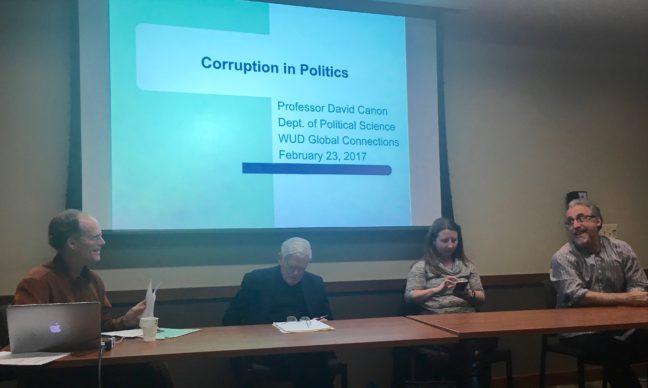Some of the most influential government corruption happening at state and federal levels might actually be legal, University of Wisconsin professors pointed out at a Wisconsin Union Directorate panel Thursday.
The Global Connections Committee hosted UW political science professors to discuss government corruption amid growing public distrust of public officials.
Political science professor David Canon compared transparency levels within countries and ethics laws within the executive branch.
Canon explained the higher a country is on the Transparency International list, the more transparent or “clean” the country is. Currently, the U.S. is 18th on the list.
Countries lower on the list are considered more untrustworthy and are more likely to have reports of instances of corruption, like bribery, Canon said.
Laws have been passed, such as Title 18 of the United States Code, which protect against political corruption, Canon said.
“By those standards, Congress is cleaner now than it was 150 years ago,” Canon said.
State legislators still cannot agree on how to keep government accountable
Members of Congress caught receiving bribes or participating in blackmail and go to jail are just a “few bad apples,” Canon said.
Cannon called members of Congress currently receiving bribes or participating in blackmail “just a few bad apples,” but said many have started to become suspicious of President Donald Trump for possible corruption.
Although Trump gave control of his businesses to his family, the discussion has zeroed in onto whether they can accept certain gifts, or bribes, Canon said. Current profit margins are unclear though, and the current situation is “uncharted territory.”
“If the Trump family is making profit from [Trump’s businesses], is that a problem?” Cannon said. “It’s hard to know what those profits would even be.”
Focusing on the state level, UW political science professor Howard Schweber said what may appear to be corruption in Wisconsin’s court system is often actually legal.
Schweber said Wisconsin has some of the most “legal corruption” in the courts out of any other state.
An example of legal corruption in Wisconsin’s courts, Schweber said, is the a ruling in which Wisconsin Supreme Court Justice Annette Ziegler sided with a bank of which her husband served as a board member.
Beginning around 2006 with nonpartisan elections, the Republican Party, and soon the Democratic Party, were contributing money to court races and supporting campaign managers.
“Is that corruption?,” Schweber said. “I would hesitate to call that corruption — more like politicalization.”
Democrats seek to curb corruption in campaign coordination with new bill
UW political science professor Eleanor Powell said bias, like in Zeigler’s case, can corrupt the legal process but isn’t enough to send judges or representatives to jail.
She said this type of influence is a “quid pro quo exchange,” or an indirect way of the public lobbying political officials with money in exchange for policy.
Unless a connection between the two can be proved with evidence, this type of persuasion is legal.
While political officials may be following the law, both on a global and state scale, there is still bribery and lobbying. This leads to a discussion of reformed corruption, Powell said.
“These are potentially serious effects on our political outcomes,” Powell said.







